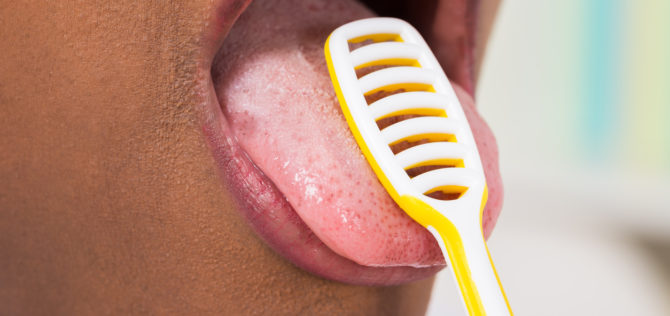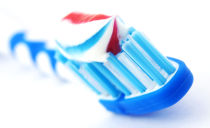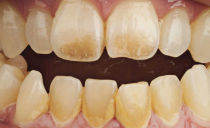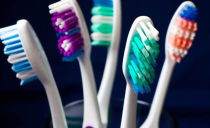Brushes, scrapers and spoons for cleaning the tongue: why are they needed, how to choose
Cleaning your tongue is the first step in the fight against periodontal disease. It is clinically proven that daily removal of plaque from the surface of the taste organ allows you to slow down the formation of dental deposits, normalize the microflora of the oral cavity and reduce the number of adhesive forms of cocci that provoke the development of caries. For effective cleaning of the tongue, you must use a special brush.
Content
Why do I need to clean my tongue?
The accumulation of plaque in the tongue is due to the relief of the papillary surface of the organ. Dead cells of the epithelium, bacteria, food debris are trapped in the microspaces between the papillae and form a loose white coating.
Cleansing the entire oral cavity from food and bacterial deposits prevents the adhesion of plaque to enamel and the subsequent development of pathologies such as:
- Gingivitis and periodontitis are diseases characterized by gum disease. With gingivitis and periodontitis, the risk of loosening of the teeth and the development of secondary adentia is high. Untimely treatment of pathologies is fraught with an abscess of the gums and jaw, bone atrophy, infectious infection of the organs of the cardiovascular system and gastrointestinal tract.
- Caries is a pathological process characterized by demineralization and destruction of enamel. Progression of caries can lead to pulpitis, periodontitis, amyloidosis and other dangerous diseases.
- Candidiasis stomatitis is an inflammation of the oral mucosa, manifested by the formation of white plaque, burning and dullness of taste perception. The disease increases the risk of sore throat, chronic laryngitis and infection of the whole body.
- Lymphadenitis is an inflammation of the lymph nodes accompanied by itching, fever, and a rash. The etiology of the disease is explained by a bacterial infection, the causative agents of which are streptococci. Running lymphadenitis leads to necrosis.
Inadequate cleaning of the surface of the tongue is fraught with the development of glossitis. The disease is accompanied by swelling and burning of the tongue, the formation of erosion and ulcers on its mucous membrane and the dullness of taste perception. Glossitis can lead to the spread of infection to internal organs, the development of sepsis, phlegmon and abscess.
Benefits of Comprehensive Oral Hygiene
The inclusion of tongue brushing in comprehensive oral care helps prevent many dental and internal diseases. However, this is not the only factor determining the importance of this procedure.
Regular cleaning of the tongue with a scraper helps:
- Increase immunity. By removing toxic food residues from the oral mucosa, their absorption in the blood is prevented, which increases the body's defenses.
- Normalization of taste perception. A special brush for cleaning the tongue removes food debris and bacteria that clog the taste buds of all areas of the tongue.
- Preventing halitosis. Using a scraper, you can remove bacteria from the root of the tongue, on which the largest number of microorganisms that cause halitosis live.
Tongue-cleansing brushes act on certain points of the organ of taste, improving blood circulation in the oral cavity and stimulating salivation.
Tongue cleaners
There are 3 main types of tongue cleansers: scrapers, brushes and spoons. All of them vary in size, material of manufacture, design and type of head. Choosing a device should be based on individual needs and preferences.
In the absence of special tools for cleaning the tongue, you can use a teaspoon. An ordinary toothbrush with a ribbed surface is also suitable. However, the use of such devices for such a specific hygienic procedure should be temporary, since they injure the mucous membrane of the tongue and are less effective in removing plaque than specialized tools.
How to choose a brush for cleaning your tongue
When choosing a language cleaner, it is recommended to pay attention to the following characteristics:
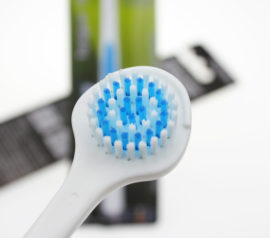 The stiffness of the bristles. Soft brushes should be preferred. Medium-hard bristles damage the back of the tongue and cause microbleeding after only a few cleaning movements.
The stiffness of the bristles. Soft brushes should be preferred. Medium-hard bristles damage the back of the tongue and cause microbleeding after only a few cleaning movements.- The material of manufacture. Most of the cleaners are made of plastic, but some are used in the manufacture of silver. Upon contact with saliva, the metal has an antibacterial effect.
- Shape and size of the cleaner. It is better to choose a brush with a long handle, adapted to the shape of the tongue.
Many stores sell language cleaning kits that include antibacterial gels. The use of gels, coupled with a brush, improves cleaning efficiency and contributes to a longer preservation of fresh breath.
How to choose a tongue scraper
Scrapers are in demand among people with a pronounced gag reflex. Externally, the head of such a device resembles a scapula. Due to the perpendicular arrangement of the “blades” to the surface being cleaned and the flat shape, the tongue scraper does not irritate its mucous membrane and does not cause nausea.
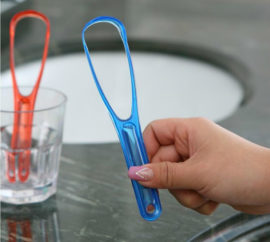 When choosing scrapers, you should focus on the following parameters:
When choosing scrapers, you should focus on the following parameters:
- The material of manufacture. Most tongue blades are made of plastic, copper or silver. Plastic scrapers are less durable than metal: They must be replaced every 7-14 days. Copper and silver models must be decontaminated in boiled water.
- Convenience of washing. The spatula needs to be rinsed after each cleaning motion, so it is important that it is easily washed under running water.
- Blade length and handle properties. A cleaner equipped with an anti-slip handle and corresponding to the size of the tongue is most convenient to use.
Many manufacturers produce combined hygiene devices - scraper brushes. On the working surface of such a cleaner there are “blades” and soft bristles. The product has a rounded shape and resembles a spoon.
Nozzles for irrigator
Irrigator is a device for hydro-jet cleaning of teeth and oral cavity. Removing food debris and other deposits is achieved by applying a thin stream of water under high pressure. The effectiveness of hydrotreating lies in the ability to clean hard-to-reach areas of the oral cavity.
To clean the tongue with an irrigator, a special nozzle-spoon is developed. The product is made with emphasis on performance and comfortable use. A spoon does not injure the surface being cleaned, does not cause a gag reflex, cleans the upper and lower sides of the tongue. It is recommended to remove plaque by means of a nozzle-spoon after brushing your teeth.
The use of any device for cleansing the tongue requires caution. Do not put excessive pressure on the surface to be cleaned and use a non-sterile cleaner. It is equally important to follow the instructions for use, as some products have features in use and contraindications.

